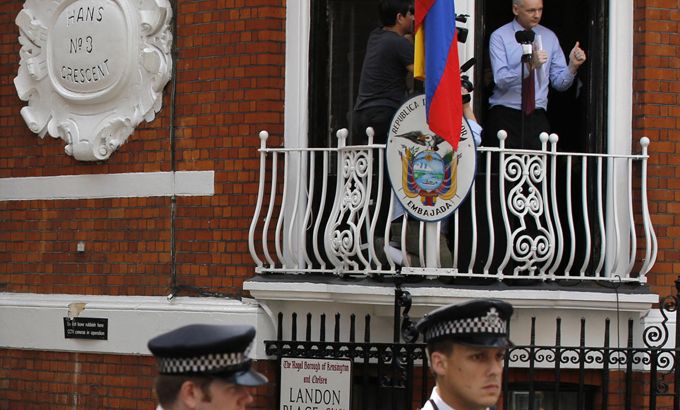
What next for Julian Assange?
As the Wikileaks founder breaks his silence, we ask how this diplomatic impasse will play out.
In what has been described as his Evita Peron moment, Wikileaks founder Julian Assange criticised everything from the media to global politics, but gave no indication of his future plans.
|
“Ecuador is not a Mecca of freedom of speech, it is not the world capital of decency – it’s the last seedy, bolt hole to which Mr Assange thinks he can run instead of facing, as I say, the very serious allegations, which he should face, whether he thinks himself innocent or not, in Sweden.“ – Douglas Murray, an author and journalist |
Just metres away from British police who would like to deport him to Sweden, Assange broke his silence on Sunday.
Two months after seeking refuge at Ecuador’s embassy in London, Assange gave a short speech.
He did not address the sexual assault allegations against him, but instead thanked his supporters and Latin American governments for their support.
During his 10-minute speech, he also urged the US to renounce what he called its “witch hunt” against his website.
“As Wikileaks stands under threat, so does the freedom of expression and the health of all of our societies,” Assange said. “I ask President Obama to do the right thing. The United States must renounce its witch hunt against Wikileaks.”
It has been almost two years since the sexual assault allegations against Assange surfaced. But his supporters fear that if he is sent to Sweden for questioning he could end up in the US facing questions about Wikileaks and its leaking of diplomatic cables.
|
“Mr Assange has the right to seek asylum. And it speaks volumes about our times that people have to actually seek asylum from the United Kingdom. This is a key indicator as to where we are and where we are currently heading.“ – Anthony Timmons, an activist and pro-Assange campaigner |
Assange has not been charged with any crime and has repeatedly volunteered to be questioned by authorities in London – but they have refused.
Baltasar Garzon, Assange’s lawyer, told Al Jazeera his client had made himself available to the Swedish authorities but was seeking certain assurances.
”Mr Assange has asked to make a statement to clear to his name and to show the inconsistency of the allegations,” Garzon said. “He’s ready to talk to the judicial authorities of Sweden but with guarantees that any other citizens in the world can have.”
So, what does the future hold for the man loved by some and reviled by others? And how much political pressure is being applied in this case?
Inside Story, with presenter Jane Dutton, speaks to guests: Khawar Qureshi QC, an international law specialist at McNair Chambers; Douglas Murray, an associate director of the Henry Jackson Society and a bestselling author and award-winning journalist; and Anthony Timmons, an activist and pro-Assange campaigner.
|
“I think Mr Assange has been bonkers and paranoid for years. It’s part of his alleged political make-up and indeed I would allege that of many of his supporters. This is not about freedom of speech, it’s a terrible elision that Mr Assange and his supporters have been trying to make all along which is that it should be … perfectly legal to steal and publish government documents from the United States or anywhere else. And the second thing is that they can pre-emptively decide that the two women in Sweden, who have made serious allegations of sexual assault, are not in any way serious and if [they] somehow were put up to it. This is a product of a fevered conspiracy mind-set from the beginning. A mind-set that which is almost messianic in its delusional belief that it can override every single norm of international law.” Douglas Murray, an author and journalist |